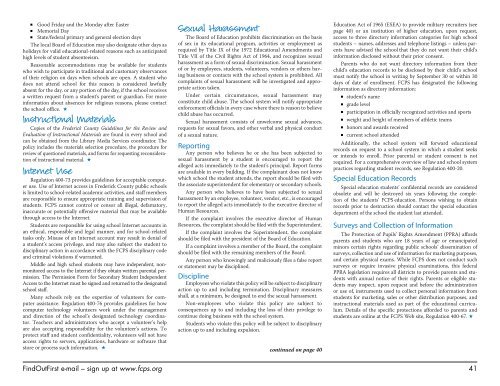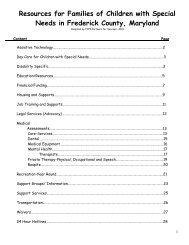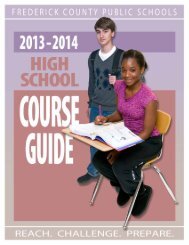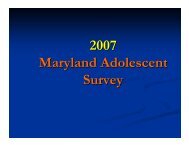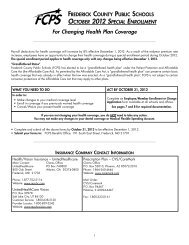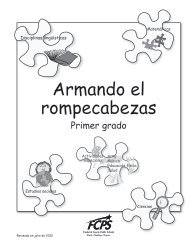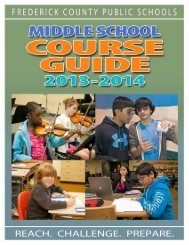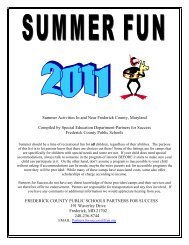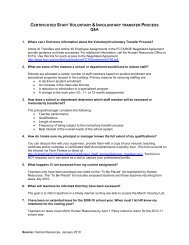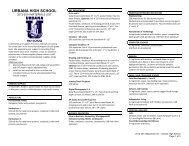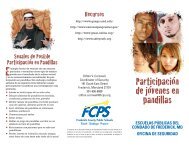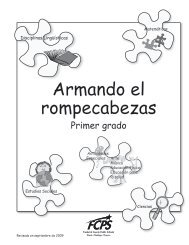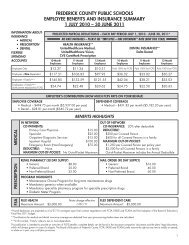Handbook - Frederick County Public Schools
Handbook - Frederick County Public Schools
Handbook - Frederick County Public Schools
Create successful ePaper yourself
Turn your PDF publications into a flip-book with our unique Google optimized e-Paper software.
n Good Friday and the Monday after Easter<br />
n Memorial Day<br />
n State/federal primary and general election days<br />
The local Board of Education may also designate other days as<br />
holidays for valid educational-related reasons such as anticipated<br />
high levels of student absenteeism.<br />
Reasonable accommodations may be available for students<br />
who wish to participate in traditional and customary observances<br />
of their religion on days when schools are open. A student who<br />
does not attend school for this reason is considered lawfully<br />
absent for the day, or any portion of the day, if the school receives<br />
a written request from a student’s parent or guardian. For more<br />
information about absences for religious reasons, please contact<br />
the school office. ★<br />
Instructional Materials<br />
Copies of the <strong>Frederick</strong> <strong>County</strong> Guidelines for the Review and<br />
Evaluation of Instructional Materials are found in every school and<br />
can be obtained from the Library Media Services coordinator. The<br />
policy includes the materials selection procedure, the procedure for<br />
review of questioned materials, and forms for requesting reconsideration<br />
of instructional material. ★<br />
Internet Use<br />
Regulation 400-73 provides guidelines for acceptable computer<br />
use. Use of Internet access in <strong>Frederick</strong> <strong>County</strong> public schools<br />
is limited to school-related academic activities, and staff members<br />
are responsible to ensure appropriate training and supervision of<br />
students. FCPS cannot control or censor all illegal, defamatory,<br />
inaccurate or potentially offensive material that may be available<br />
through access to the Internet.<br />
Students are responsible for using school Internet accounts in<br />
an ethical, responsible and legal manner, and for school-related<br />
tasks only. Misuse of an Internet account may result in denial of<br />
a student’s access privilege, and may also subject the student to<br />
disciplinary action in accordance with the FCPS disciplinary code<br />
and criminal violations if warranted.<br />
Middle and high school students may have independent, non-<br />
monitored access to the Internet if they obtain written parental permission.<br />
The Permission Form for Secondary Student Independent<br />
Access to the Internet must be signed and returned to the designated<br />
school staff.<br />
Many schools rely on the expertise of volunteers for computer<br />
assistance. Regulation 400-76 provides guidelines for how<br />
computer technology volunteers work under the management<br />
and direction of the school’s designated technology coordinator.<br />
Teachers and administrators who accept a volunteer’s help<br />
are also accepting responsibility for the volunteer’s actions. To<br />
protect staff and student confidentiality, volunteers will not have<br />
access rights to servers, applications, hardware or software that<br />
Sexual Harassment<br />
The Board of Education prohibits discrimination on the basis<br />
of sex in its educational program, activities or employment as<br />
required by Title IX of the 1972 Educational Amendments and<br />
Title VII of the Civil Rights Act of 1964, and recognizes sexual<br />
harassment as a form of sexual discrimi nation. Sexual harassment<br />
of or by employees, students, volunteers, vendors or others having<br />
business or contacts with the school system is prohibited. All<br />
complaints of sexual harassment will be investigated and appropriate<br />
action taken.<br />
Under certain circumstances, sexual harassment may<br />
constitute child abuse. The school system will notify appro priate<br />
enforcement officials in every case where there is reason to believe<br />
child abuse has occurred.<br />
Sexual harassment consists of unwelcome sexual advances,<br />
requests for sexual favors, and other verbal and physical conduct<br />
of a sexual nature.<br />
Reporting<br />
Any person who believes he or she has been subjected to<br />
sexual harassment by a student is encouraged to report the<br />
alleged acts immediately to the student’s principal. Report forms<br />
are available in every building. If the complainant does not know<br />
which school the student attends, the report should be filed with<br />
the associate superintendent for elementary or secondary schools.<br />
Any person who believes to have been subjected to sexual<br />
harassment by an employee, volunteer, vendor, etc., is encouraged<br />
to report the alleged acts immedi ately to the executive director of<br />
Human Resources.<br />
If the complaint involves the executive director of Human<br />
Resources, the complaint should be filed with the Superintendent.<br />
If the complaint involves the Superintendent, the complaint<br />
should be filed with the president of the Board of Education.<br />
If a complaint involves a member of the Board, the complaint<br />
should be filed with the remaining members of the Board.<br />
Any person who knowingly and maliciously files a false report<br />
or statement may be disciplined.<br />
Discipline<br />
Employees who violate this policy will be subject to disciplinary<br />
action up to and including termination. Disciplinary measures<br />
shall, at a minimum, be designed to end the sexual harassment.<br />
Non-employees who violate this policy are subject to<br />
consequences up to and including the loss of their privilege to<br />
continue doing business with the school system.<br />
Students who violate this policy will be subject to disciplinary<br />
action up to and including expulsion.<br />
store or process such information. ★ continued on page 40<br />
Education Act of 1965 (ESEA) to provide military recruiters (see<br />
page 40) or an institution of higher education, upon request,<br />
access to three directory information categories for high school<br />
students – names, addresses and telephone listings – unless parents<br />
have advised the school that they do not want their child’s<br />
information disclosed without their prior consent.<br />
Parents who do not want directory information from their<br />
child’s education records to be disclosed by their child’s school<br />
must notify the school in writing by September 30 or within 30<br />
days of date of enrollment. FCPS has designated the following<br />
information as direc tory information:<br />
n student’s name<br />
n grade level<br />
n participation in officially recognized activities and sports<br />
n weight and height of members of athletic teams<br />
n honors and awards received<br />
n current school attended<br />
Additionally, the school system will forward educa tional<br />
records on request to a school system in which a student seeks<br />
or intends to enroll. Prior parental or student consent is not<br />
required. For a comprehensive overview of law and school system<br />
practices regarding student records, see Regulation 400-20.<br />
Special Education Records<br />
Special education students’ confidential records are considered<br />
obsolete and will be destroyed six years following the completion<br />
of the students’ FCPS education. Persons wishing to obtain<br />
records prior to destruction should contact the special education<br />
department of the school the student last attended.<br />
Surveys and Collection of Information<br />
The Protection of Pupils’ Rights Amendment (PPRA) affords<br />
parents and students who are 18 years of age or emancipated<br />
minors certain rights regarding public schools’ dissemination of<br />
surveys, collection and use of information for marketing purposes,<br />
and certain physical exams. While FCPS does not conduct such<br />
surveys or require invasive physical examinations, this federal<br />
PPRA legislation requires all districts to provide parents and students<br />
with annual notice of their rights. Parents or eligible students<br />
may inspect, upon request and before the administration<br />
or use of, instruments used to collect personal information from<br />
students for marketing, sales or other distribution purposes, and<br />
instructional materials used as part of the educational curriculum.<br />
Details of the specific protections afforded to parents and<br />
students are online at the FCPS Web site, Regulation 400-67. ★<br />
FindOutFirst e-mail – sign up at www.fcps.org 41


